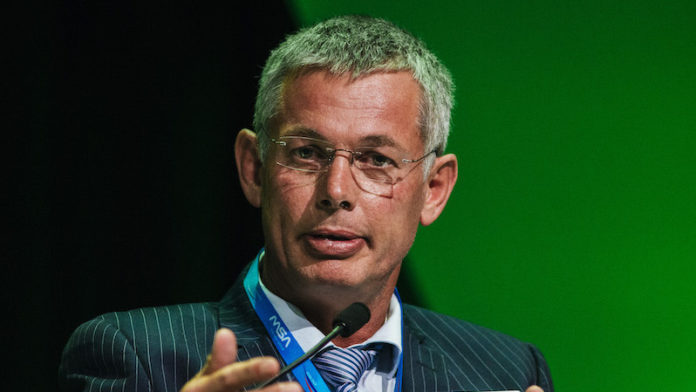
IMPALA Platinum (Implats) CEO Nico Muller played down the need to cut production or scale back projects amid the drastic slide in platinum group metal (pgm) prices, but he said urgent work was required to get the firm’s newly acquired Royal Bafokeng Platinum (RBPlat) up to speed.
“I don’t think major restructuring or suspension of operations will happen in the near term,” Muller told reporters this morning. “We have got a number of options available to us. We won’t support loss-making but we won’t make decisions in the short-term.”
One asset that was causing him concern was RBPlat. According to him, RBPlat wasn’t performing to the levels currently that would justify his firm’s takeover bid, completed in July after 18 months duelling for the asset with Northam Platinum. “RBPlat will require dedicated attention,” Muller said.
“The deal was premised on a shallow, mechanised, productive, safe, low cost and low capital business. What has transpired is constraints in processing throughput and ramping up of Styldrift. Cost increases have been in the high double digits,” he said.
Muller cited “fundamental weaknesses” at RBPlat’s processing plants, especially Maseve, as well as how pre-emptive maintenance, spares sourcing, stockholding, and inventories was managed. “When I look at operations at risk, certainly RBPlat will require a lot of attention to get to cost of operation we aspired to when we made offer for company 18 months ago.”
RBPlat published interim numbers on August 1 that bore the hallmarks of uncertainty caused by its takeover battle. Safety deteriorated, costs rose, and production fell 2.5% to 219,800 ounces (4E metals in concentrate). Combined with difficult trading conditions – a function of inflation and declining metal prices – the company announced a 113.8 cents per share interim headline loss.
Muller was commenting following publication of the PGM firm’s annual results where declining metal prices, especially in the second half of the financial year, were evident. Implats’ headline earnings, which exclude impairments on Impala Canada mine and RBPlat, previously flagged in a trading statement, were 41% lower at R18.8bn.
Unsurprisingly, Implats’ final dividend announcement of 165 cents a share was the lower end of dividend policy which is to pay 30% of adjusted free cash flow before deploying growth capital. It took Implats’ total dividend to 585 cents/share (2022: 1,575 cents/share).
Implats closed the 12 months (June 30) with net cash of R26.8bn (2022: R28.5bn). After paying the dividend and the balance of RBPlat, due to delist on September 18, Implats would have a cash balance of about R11bn.
Muller acknowledged to being surprised by the speed with which PGM prices declined, especially in the second half of the firm’s financial year. Average revenue per ounce sold fell 4% in rands as a 16% depreciation of the rand against the dollar price declines which were significant. Palladium and rhodium were down 20% and 28% respectively.
In dollar terms the average basket was 18% weaker which meant Impala Canada was hit hard by the market, especially as it is predominantly a palladium producer. Muller said there was flexibility to mine higher grade although it would shorten mine.
However, he added there were “higher levels of challenges” at mines with replacement or expansion capital projects such as Two Rivers and Zimplats. As with Impala Canada, Zimplats operates in dollars and therefore doesn’t have protection of a weakening currency.











